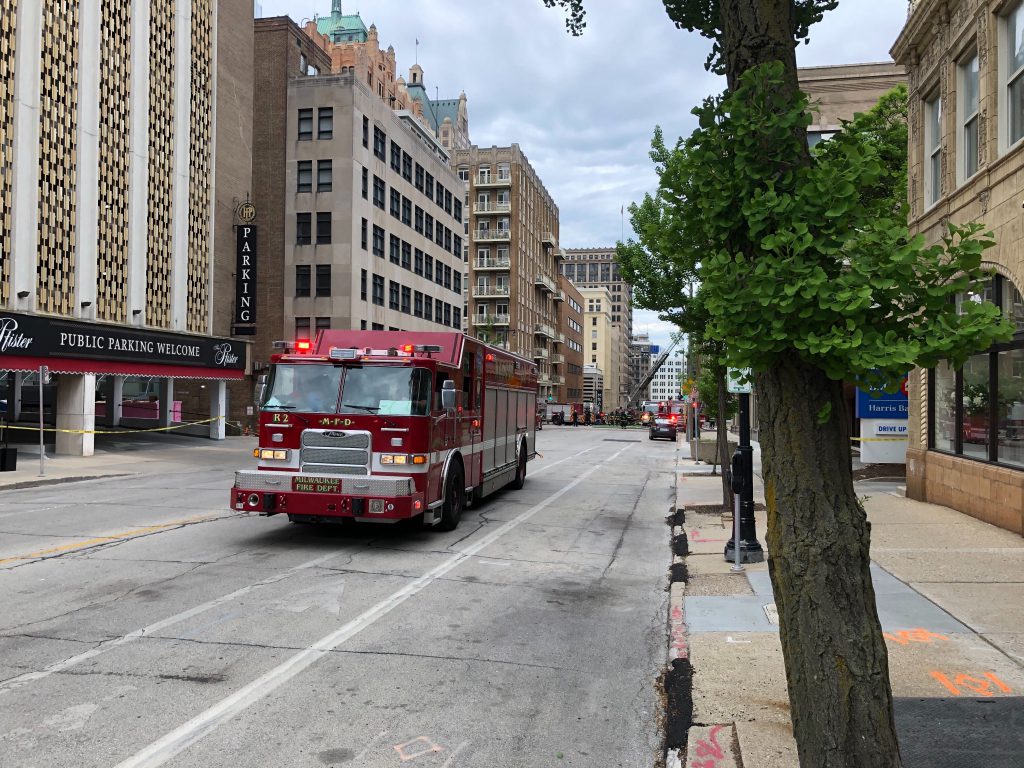Local Governments Face Huge Revenue Losses
Continuing COVID-19 losses could force employee furloughs, major service cuts.
Local governments across Wisconsin will lose about $400 million in revenues this year because of the COVID-19 pandemic – losses that can’t be made up with emergency-relief dollars from Washington or Madison, according to the League of Wisconsin Municipalities (LWM).
LWM officials offered specific examples:
*The City of Oshkosh projected income losses of $1.65 million in just four accounts: $1 million in lost room taxes, $200,000 in lost parking revenues, $300,000 in unreimbursed emergency medical services (EMS), and $150,000 in lost court fines and forfeitures.
*The City of Janesville reported to LWM that its projected losses in unreimbursed EMS costs this year will total $847,800.
*The City of Brookfield projected room tax revenue losses of $2.5 million.
*The City of Eau Claire estimated that it won’t collect more than $650,000 in three accounts: $300,000 in lost court fines and forfeitures, $250,000 in lost EMS reimbursements, and $100,000 in parking fees.
Wisconsin’s three municipalities with more than 500,000 population qualified for both federal and state COVID-19 aid, according to the Legislative Fiscal Bureau: City of Milwaukee, a total of $126 million; Milwaukee County, $77 million, and Dane County, $103 million.
On May 27, Gov. Tony Evers announced “Routes to Recovery” grants that total $190 million to local governments, drawing down $1.9 billion in federal COVID-19 aid the governor controlled.
But local governments cannot use that $190 million to make up lost revenues, said LWM Executive Director Jerry Deschane. “We appreciate the ($190 million), but that’s not where the real hole is,” he said. “Lost revenue is the far bigger problem.”
Wisconsin cities and villages get about one-third of their budgets from sources like room taxes, fines and forfeitures, parking fees, EMS reimbursements, licensing fees and other programs, Deschane said. Municipal water utilities serve both businesses and homes.
Cities and village adopted budgets for 2020 that balanced revenues and expenses last fall, Deschane noted. But, beginning in mid-March, “Those revenues cratered. They’re just gone.”
For example, although Brookfield estimated its room tax revenue losses at $2.5 million this year, it will get $649,505 in Routes to Recovery cash. The Madison suburb of Middleton projected losing $1.4 million in room taxes, but it is in line for $336,472 from Routes to Recovery.
Oshkosh’s projected loss of $1.6 million in revenues in four accounts is $600,000 more than it will get from Routes to Recovery. And, although Janesville expected to get $1 million from Routes to Recovery, lost EMS reimbursements could total 84 percent of that.
EMS systems statewide stopped being reimbursed by Medicare for transports to hospitals, which shut down for all but “emergency, dire” cases because of the pandemic, he noted.
When it announced Routes to Recovery grants, the Evers Administration said the $190 million could be used for “unbudgeted expenses” caused by COVID-19 and specifically for:
*Purchasing personal protection equipment (PPE). Every EMS worker wears about $25 worth of PPE on each call, Deschane said.
*Cleaning and sanitizing municipal work areas, including polling places.
*Family Medical Leave Act and sick leave for public health and safety employees. If an EMS worker has been exposed to someone with COVID-19, they must quarantine — with pay — for 14 days, Deschane noted.
Deschane acknowledged that businesses that closed, and workers who lost their jobs, also lost income. But, he added, local governments operate critical infrastructure services like sewers and water systems; police, fire and EMS departments, and street repair and maintenance. “These essential services have to go on.”
If COVID-19 revenue losses continue, local governments will have no choice but furloughing employees and cutting services, Deschane said.
Wisconsin law does not allow local governments to file for bankruptcy. Local governments can dissolve, but state officials have never let that happen because it would “blow up municipal finance,” Deschane said.
“Wisconsin has a reputation as having very high quality services,” he said. “The Legislature, the governor – they value that.”
Local government leaders also won’t pick a “political fight” in the Capitol by asking that state-imposed limits on their 2021 property tax levies be removed, he said.
Instead, local governments need federal aid to keep paying COVID-19 bills, Deschane said. “There has to be a federal backstop for that revenue loss.”
Steven Walters is a senior producer for the nonprofit public affairs channel WisconsinEye. Contact him at stevenscotwalters@gmail.com
If you think stories like this are important, become a member of Urban Milwaukee and help support real, independent journalism. Plus you get some cool added benefits.
More about the Coronavirus Pandemic
- Governors Tony Evers, JB Pritzker, Tim Walz, and Gretchen Whitmer Issue a Joint Statement Concerning Reports that Donald Trump Gave Russian Dictator Putin American COVID-19 Supplies - Gov. Tony Evers - Oct 11th, 2024
- MHD Release: Milwaukee Health Department Launches COVID-19 Wastewater Testing Dashboard - City of Milwaukee Health Department - Jan 23rd, 2024
- Milwaukee County Announces New Policies Related to COVID-19 Pandemic - David Crowley - May 9th, 2023
- DHS Details End of Emergency COVID-19 Response - Wisconsin Department of Health Services - Apr 26th, 2023
- Milwaukee Health Department Announces Upcoming Changes to COVID-19 Services - City of Milwaukee Health Department - Mar 17th, 2023
- Fitzgerald Applauds Passage of COVID-19 Origin Act - U.S. Rep. Scott Fitzgerald - Mar 10th, 2023
- DHS Expands Free COVID-19 Testing Program - Wisconsin Department of Health Services - Feb 10th, 2023
- MKE County: COVID-19 Hospitalizations Rising - Graham Kilmer - Jan 16th, 2023
- Not Enough Getting Bivalent Booster Shots, State Health Officials Warn - Gaby Vinick - Dec 26th, 2022
- Nearly All Wisconsinites Age 6 Months and Older Now Eligible for Updated COVID-19 Vaccine - Wisconsin Department of Health Services - Dec 15th, 2022
Read more about Coronavirus Pandemic here
The State of Politics
-
A Wisconsin Political Trivia Quiz
 Dec 15th, 2025 by Steven Walters
Dec 15th, 2025 by Steven Walters
-
The Fight Over Wisconsin’s House Districts
 Dec 8th, 2025 by Steven Walters
Dec 8th, 2025 by Steven Walters
-
The Battle Over On-Line Betting
 Nov 24th, 2025 by Steven Walters
Nov 24th, 2025 by Steven Walters























The lobbying pressure needs to occur at the federal level. Five of eight Wisconsin members of the House of Representatives and one of our Senators are Republicans. Allowing the COVID-19 federal grant to be used for revenue replacement would be a great start. Biden ads should start pushing this as well.